(RNS) — Tom Cornell, the longtime Catholic pacifist who humbly referred to Catholic Worker co-founder Dorothy Day as “my spiritual mother,” died Monday (Aug. 1) in a hospital near the Peter Maurin Catholic Worker farm that he helped run with his family in Marlboro, New York, where he lived with his wife of 58 years, Monica.
Cornell, 88, died of complications from an aneurysm after a short illness.
A Roman Catholic deacon, Cornell was an early opponent of the Vietnam War, organizing one of the first protests against the war in Manhattan in 1963. An author and lecturer, Cornell spent his life promoting nonviolence, conscientious objection and the Catholic “Works of Mercy” that represent the core values of the Catholic Worker Movement.
In a 2011 profile of Cornell in the Jesuit magazine America, he recalled meeting Day for the first time at the “motherhouse” on Manhattan’s Lower East Side, taking a train from his native Bridgeport, Connecticut, when he was just 19: “Once I got there all the chairs were taken, with some people sitting on the floor with their backs against the wall. I noticed a woman up front with gray hair arranged in braids on top of her head, sitting cross-legged on the floor. ‘That’s Dorothy Day,’ the person beside me whispered.”
RELATED: Evidence of Dorothy Day’s ‘everyday’ sainthood heads to Rome, boxed and beribboned
Cornell stayed close to Day, living in the New York house, helping to run another Catholic Worker house in Waterbury, Connecticut, and living on the Marlboro farm in the latter part of his life.
But Cornell rubbed elbows throughout his life with prominent religious pacifists and activists. In the fall of 1964, he was among 14 men (only) invited to attend the legendary retreat at the Abbey of Gethsemani hosted by Trappist monk Thomas Merton. Gathered at Merton’s cottage were a who’s who of peace activists, including Philip and Daniel Berrigan, Jim Forest, John Howard Yoder and A.J. Muste. Martin Luther King Jr. missed the retreat to receive the Nobel Peace Prize.
Ken Curtin, who sought out Cornell for “draft counseling” during the Vietnam War, ended up joining the staff of the Catholic Peace Fellowship, which Cornell co-founded. Curtin accompanied Cornell on trips to give speeches on conscientious objection and pacifism.
“All you had to do was follow Tom and you’d meet Lanza del Vasto, you’d meet Danilo Dolci (the Italian nonviolent social activist known as “the Gandhi of Italy”), Dom Helder Camara (former Brazilian archbishop),” Curtin said. “You’d get to meet these people and travel with them.”
In his home office, Cornell kept a framed letter from Salvadoran Archbishop Oscar Romero, received just weeks before Romero was killed by a gunman suspected of working for the right-wing government.
In the early 1960s, Day gave Cornell the job of managing editor of the New York Catholic Worker newspaper. He also worked 14 years with the Fellowship of Reconciliation and more than 30 years with the Catholic Peace Fellowship.
In 1967, the U.S. Catholic bishops appointed Cornell and Day to attend the 1967 Third World Congress of the Laity in Rome. In 2000, Cornell served as St. John Paul II’s deacon at the Mass of Christ the King in St. Peter’s Square at the Fourth World Congress. Cornell also served as a consultant for the 1983 National Conference of Catholic Bishops pastoral letter, “The Challenge of Peace: God’s Promise and Our Response.” In March 1965, Cornell served as one of Martin Luther King Jr.’s marshals on the March to Montgomery. Cornell was a co-founder of Pax Christi USA, which named him an ambassador of peace.

Tom Cornell in a 1971 interview. Video screen grab
Mike Baxter, who will deliver Cornell’s eulogy, told Religion News Service: “Tom worked side by side with Dorothy on issues of war and peace. He followed her lead when it came to organizing nonviolent protest against war.”
“He learned from her, and he loved her very much,” said Day’s granddaughter, Martha Hennessy. “I did some talks with him too, and on the train we would read from the breviary together and that was really lovely.”
Cornell adhered closely to a Gandhian vision of nonviolence and open direct action, often putting him at odds with Catholics and others who destroyed and burned files in draft board raids during the Vietnam War, Baxter said.
“Tom always cleaved to Gandhian principles: published plans beforehand, public demonstrations, no secret plans, no covert break-ins,” Baxter said. “This is a point of division among peace activists to this day. My own view: There is room for both, indeed for many forms of anti-war activism. Let 10,000 flowers bloom.”
Cornell also liked to cite the church’s just-war criteria as a talking point rather than disavow it entirely, Baxter said.
“Tom was ready to converse with the just-war tradition, convinced that applying its principles to modern war would render the verdict that any modern war is unjust,” Baxter said. “He allowed for a form of just-war pacifism, as it is called.”
This stance didn’t dilute Cornell’s commitment to peace or his opposition to the draft. In his office, Baxter, director of Catholic studies at Regis University in Denver, keeps a framed photograph of Cornell outside the federal courthouse in New York, burning his draft card with four others while Day and Muste look on. Cornell was arrested for the protest and spent six months in federal prison.
Thomas Charles Cornell was born April 11, 1934, the elder of Thomas and Ann Caruso Cornell’s two children. In addition to his wife, he is survived by his children, Thomas, who operates the Catholic Worker Farm in Marlboro, and Deirdre; grandchildren Rachel, Thomas, Seamus, Rebecca and Rosa; and his sister, Ann Marie Tomasiello.
“You realize that no one is going to live forever and that our parents do have to go, but you’re unprepared somehow,” said Deirdre Cornell, who, with her brother, was at their father’s bedside when he died in the middle of the night. “There is always that sense of loss that catches you off-guard, I guess; it’s very deep.”
RELATED: His parish was the poor: The Rev. Tom Lumpkin spent 40 years ministering to Detroit’s homeless
For years, she and her husband, Kenney Gould, who met as lay missioners in Mexico, have worked with immigrants from Latin America.
She said that when she brought her then new boyfriend and future husband home to meet her father for the first time, “My father really want(ed) to know what Kenney thinks about Gandhi’s position on civil disobedience and how it should be carried out.”
Her relationship survived the grilling. “I know that my parents were definitely trying to open us up to people who are in need,” Deirdre Cornell said, “and to people who are in different struggles for justice and peace and to identify closely with them. I think my father had this amazing gift. He had this thing of being able to connect with people in that way, which, it’s kind of remarkable.”





